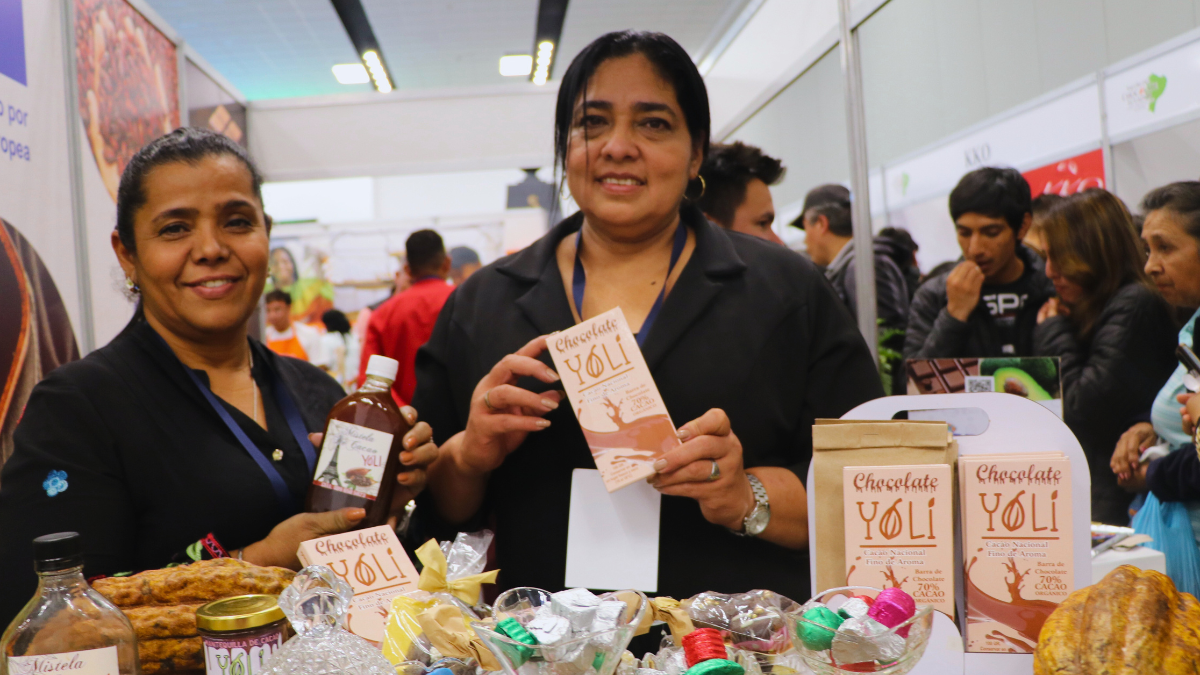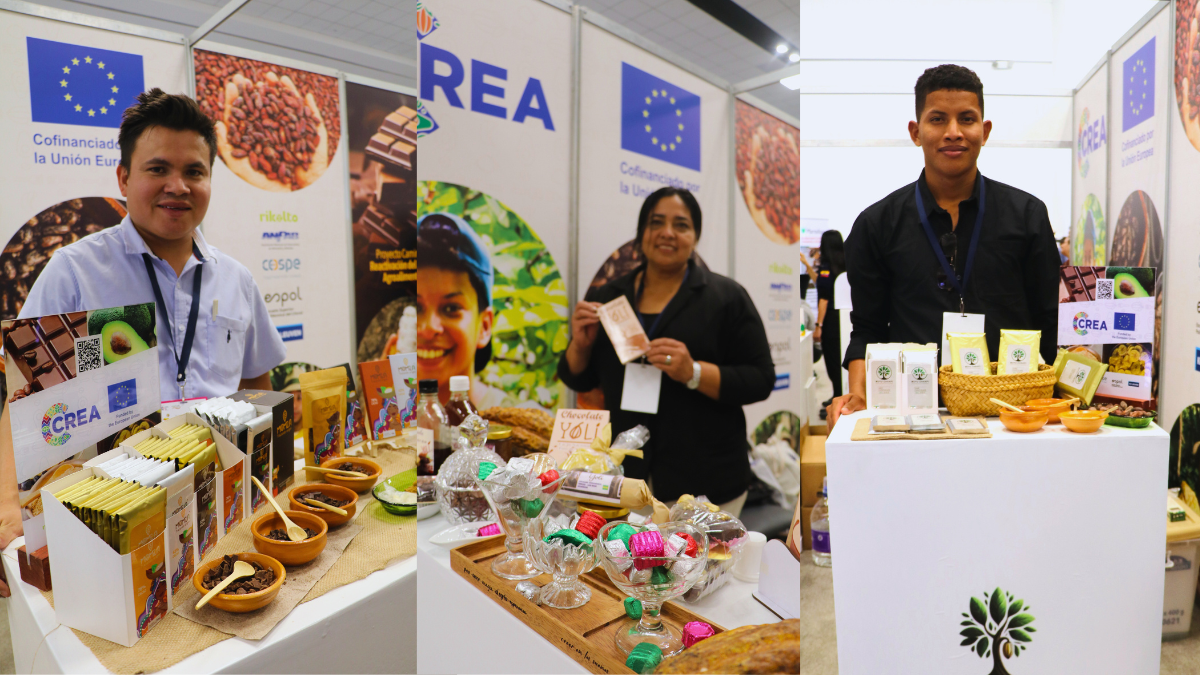
Whether they are 18 or 65, the passion for entrepreneurship and community transformation knows no bounds. From the southern Andes, across the lush Amazon, to the Ecuadorian coast, women and young people are defying barriers of connectivity and technology, and even prolonged nationwide power cuts, to strengthen their business ideas.
That is exactly what 34 entrepreneurs, women and young people did after taking part in a professional development programme organised by Rikolto as part of the EU-funded CREA (Camino a la Reactivación del Ecuador Agroalimentario) project. Through this initiative, 21 of them competed for seed capital worth $3,000, while also expanding their experience at the Encuentro de Jóvenes y Mujeres Emprendedores (a young and women entrepreneurs' exchange and training programme) in Quito.
It was a space for learning, mentoring and empowerment, proving that with purpose, anything is possible.
Here are some of their stories.
As the grandson of one of the founders of APROCAM, an organisation that has produced cacao for over two decades, 25-year-old David Esmeraldas is determined to keep his community's agricultural legacy alive. He sees cacao farming as a way of preventing forced migration. His perspective led him to found Muyu Chaapi, a purpose-driven chocolate venture rooted in community and self-sufficiency.
.png)
‘'Many young people emigrate in pursuit of a better life, but the idea behind this project is to empower each other using what we have: chocolate. If we organise ourselves, learn and take ownership, we can make this sustainable and create better opportunities for our families.”
David and his fellow entrepreneurs, working in the production of cocoa, coffee, guayusa and bananas, faced power cuts of almost ten hours a day, like the rest of Ecuador, as a result of recent government measures. This did not deter them from joining the online and in-person training and exchange programme, which consisted of more than 40 hours of practical sessions online on business model design, commercial strategies, finance, sustainability and pitching their ventures. The exchange programme was organised in February this year.
The training was both challenging and an opportunity to develop their business ideas with stronger and more sustainable support for the long term. Many of the proposals stood out thanks to their roots, their environmental considerations, and their focus on healthier and more accessible food. These ideas emerged in an unfavourable environment, characterised by a lack of adequate infrastructure, educational gaps, limited market access and scarce access to credit. In this context, women and young people are seeking alternatives to remain in rural areas, earn a living and help revitalise their communities.
Throughout the two intensive days, that followed the online sessions, they received advice on presenting their pitch from entrepreneurs in the agri-food sector and support from young entrepreneurial leaders who, in 2024, participated in a similar business incubation programme through Rikolto's 'Generación Food' project. This aspect of the experience highlighted that young people can face the challenges of the world more effectively when they work together.
When roots are strong, dreams can really take off. Out of the 34 participating start-ups, 15 received seed capital of $3,000 each to help grow their businesses. Of these, 13 were recognised in the Pitch Defence category and two in the Special Mention category for their social and environmental impact.
The initiatives ranged from handicrafts made with Amazonian seeds and community-based proposals such as “happy chickens” from the Association of Coffee Growers of Rio Intag (ACRI), to projects led by young people in organic farming and food processing. What they all share is a high level of innovation, environmental commitment and a deep connection to their cultural roots.
David reflected that the experience had equipped him with new tools for presenting his venture to investors. A process that had once left him stressed, anxious and doubtful of his abilities became an opportunity to reaffirm his strengths.
“The process of making a pitch was a wonderful and novel experience. I learned how to structure an effective three-minute presentation. I felt under a lot of pressure and my heart was pounding, but we achieved our goal: to present our business idea and get support.” David, 25, entrepreneur.
Another participant, Yolanda Peñafiel from the 15 de Septiembre Association in Vinces, Los Ríos Province, presented her chocolate brand Yoli.

The judges were impressed not only by the flavour of the chocolates but also by the presentation strategy. A taster at the trainig even highlighted the fruity notes, praising the smooth texture and the high quality of the cocoa. Beyond promoting her own business, Yolanda motivates other women in her community, showing them that they too can lead with creativity and resilience. She shares technical knowledge, runs motivational workshops and champions women’s leadership in the agri-food sector.
“Since participating and winning, I have been able to strengthen my business. With the seed capital, I purchased a refiner and a husker to improve my production. As women, we are creative and strong, and we never let obstacles defeat us.” Yolanda Peñafiel, 52, entrepreneur.
.png)
"This entrepreneurship training is part of the actions we are promoting to improve job opportunities and inclusion for women and young people, as well as diversifying access to resources and encouraging generational renewal."
In line with the CREA project’s strategies to promote economic empowerment and improve market access for Ecuadorian SMEs, four of the ventures that won seed capital took part in the Chocolate Show (Salón del Chocolate) in Quito, one of the country’s most important events for showcasing innovative cocoa products. There, they connected with potential buyers, explored new market opportunities, learned about packaging trends, networked with other producers and established strategic alliances, raising the profile of Ecuadorian cocoa in both national and international markets.
Ignacio Zambrano, founder of Momza, a brand of chocolates and other cocoa products, described the experience as a turning point in his entrepreneurial journey. He is now developing eco-friendly packaging made from cocoa by-products.
"I live in an area where organic cocoa is grown and I identified a business opportunity out of necessity. Over time, I realised that it is not just about selling a product, but about sharing a purpose: promoting fair trade, innovation and care for the environment." — Ignacio Zambrano, 32, entrepreneur.
Across Ecuador, young people and women are offering solutions to challenges linked to rural life. Entrepreneurship training is one of the initiatives promoted by the CREA project to improve job opportunities and inclusion, foster intergenerational collaboration and economic empowerment, and provide access to financial resources and technical knowledge. Supporting new ideas also encourages resource diversification and collaboration among young people, which are priorities within Rikolto’s Sustainable Cocoa and Coffee Programme.

CREA is co-financed by the European Union and implemented in partnership with the National Association of Food and Beverage Manufacturers (ANFAB), the Italian NGO COSPE, and Ecuadorian universities including the Polytechnic School of the Litoral (ESPOL) and KU Leuven in Belgium.
Editors: Natalia Palomino, communications coordinator | Selene Casanova, communications coordinator | Janeth Mena, Inclusion Advisor.